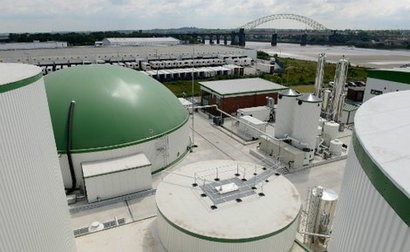
The energy generated over the past year from the food waste is enough to power 5,000 homes or 10 percent of Sainsbury’s entire national gas consumption for the year, ReFood having supplied the supermarket chain with almost 50 million kilowatt hours (KWh) of biomethane to date. The agreement with the recycling company entails collection of the food waste from two Sainsbury’s depots in Sherburn-in-Elmet and Haydock, after which it is transported to ReFood’s state-of-the-art anaerobic digestion (AD) plant where it is used to generate green gas. This is then exported to the national gas grid and then supplied to Sainsbury’s stores nationwide through a third party where it is used for power and heating.
Anaerobic digestion is a natural process where organic materials are broken down by naturally occurring micro-organisms. This releases biogas that can be used to generate renewable heat and power, helping to reduce dependence on fossil fuels, while minimising greenhouse gas emissions.
The agreement is one of the largest of its kind in the UK and involved ReFood supplying both green gas and supporting certification. The agreement has made it possible for ten stores to significantly increase their use of renewable energy while also lowering utility bills. The partnership is also helping Sainsbury’s to reduce the amount of inedible food waste sent to landfill. The edible food waste is donated to local charity partners.
“Increasing the sustainability of our UK stores is a key corporate priority and we’re making great progress in our drive to reduce food waste across the business” said Paul Densham, utilities buyer at Sainsbury’s. “Working in partnership with ReFood allows us to effectively recycle our food waste while creating green gas. What’s more, it sits well alongside our wider sustainability goals, such as working with food redistribution charities and prioritising sustainable transport strategies. The project has helped us to become a market leader in sustainability and waste reduction, ensuring that we send zero waste to landfill – a promise we’ve been able to make for some years now.”
Philip Simpson, commercial director at ReFood, added that by using the company’s national network of processing plants, ReFood has provided a truly sustainable solution for stores across the UK. The partnership has helped to generate a significant volume of green gas while also enabling Sainsbury’s to reduce its consumption of fossil fuels, minimise utility bills and eliminate unnecessary food waste disposal. The AD process also generates a highly effective sustainable biofertiliser which means that stores across the UK are working together to help close the food supply chain, from farm to fork and back again.
For additional information:

